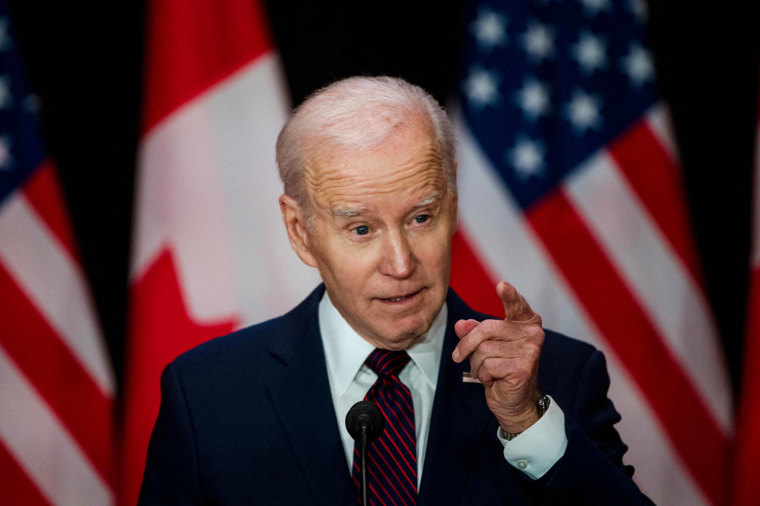President Joe Biden warned Iran on Friday that attacks on American troops would be met with retribution after militias launched a series of rocket and drone attacks against coalition bases in Syria.
“Make no mistake, the United States does not, does not, I emphasize, seek conflict with Iran,” Biden told a news conference in Ottawa during a state visit to the Canadian capital. “But be prepared for us to act forcefully to protect our people.”
Separately, Biden told NBC News that the U.S. was “not going to stop” fighting the Islamic State group in the region.

Two Congressional GOP sources familiar with the matter said it took the Biden administration nearly 14 hours after the initial strike by alleged Iranian proxies on Thursday to notify Congress.
Biden's comments came after an American service member was injured at a base near the Conoco Gas field in northeastern Syria, which took incoming rocket fire, two U.S. officials, one from Defense, told NBC News.
Less than an hour later, the officials said three drones had attacked the Green Village, a U.S. installation in the area. Two were shot down and one damaged a building but there were no injuries, the officials said. Earlier on Friday, a 10-rocket attack on Green Village yielded no casualties or damage, they added.
The attacks came after the U.S. carried out retaliatory airstrikes following an attack that killed an American contractor when a suicide drone hit a coalition base near Hasakah in the country’s northeast. Five U.S. service members and another contractor were wounded.
Defense Department spokesman Brig. Gen. Patrick Ryder told a Pentagon news briefing Friday that two U.S. Air Force F-15E fighter aircraft had conducted the strikes in response to that attack and to “a series of recent attacks against coalition forces in Syria” by groups affiliated with Iran's Islamic Revolutionary Guard Corps.
The strikes, he said, “were intended to send a very clear message that we will take the protection of our personnel seriously and that we will respond quickly and decisively if they are threatened.”
He added that the attacks had been authorized by Defense Secretary Lloyd Austin at the direction of Biden.
The Syrian Observatory for Human Rights, a London-based opposition war monitor that relies on local sources, reported that the American strikes had killed 11 fighters on the ground.
NBC News has not verified the report.
U.S. forces entered Syria in 2015, backing allied forces in their fight against the Islamic State terrorist group, and there are roughly 900 U.S. troops, and even more contractors, in Syria.
Isis lost its last key territory in Syria in 2019, after an offensive by Syrian Democratic Forces fighters — a coalition of ethnic militias and rebel groups in Syria — and a U.S-led multinational coalition.
Although Iran opposes the militant group, the uptick in violence marks an escalation in tensions between Tehran and Washington, which have been feuding over Iran's advancing nuclear program, anti-regime protests and its drone deliveries to Russia.
Having tried and so far failed to revive a landmark 2015 nuclear deal abandoned by Trump, the Biden administration has been tightening economic pressure on Iran and has sent a signal that military force remains an option if all other means fail to stop Iran from developing nuclear weapons.
Iran agreed to restore diplomatic ties with Saudi Arabia in March after seven years of tensions. The truce, brokered by China, was widely seen as a symbol of waning American influence in the Middle East.
